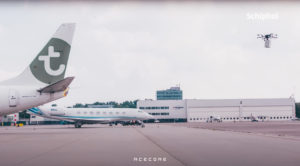 Drones have had a bad reputation at airports. Since the infamous Gatwick incident during the holiday travel season of 2018, which caused week-long chaos for airlines and travelers and cost an estimated $65 million in damages, most of the drone projects for airlines and airports have been focused on keeping them out. Now, Netherlands-based Acecore Technologies is making the case for letting them in: proving that drones can be valuable assets for the commercial airline industry.
Drones have had a bad reputation at airports. Since the infamous Gatwick incident during the holiday travel season of 2018, which caused week-long chaos for airlines and travelers and cost an estimated $65 million in damages, most of the drone projects for airlines and airports have been focused on keeping them out. Now, Netherlands-based Acecore Technologies is making the case for letting them in: proving that drones can be valuable assets for the commercial airline industry.
While Amsterdam’s Schiphol airport lies relatively quiet during the current COVID-19 crisis, airport and government airspace authorities have seized upon the unique opportunity to evaluate commercial drone operations. “Working together with Dutch Drone Delta, Schiphol aimed to test the technical as well as the social aspect of drones flying at an active airport,” says an Acecore press release. “Under the temporary exemption and in close contact with the ASNP, drones were allowed to fly in the CTR to test applications such as runway inspection and delivery of airplane parts across the airport.”
It’s the perfect place to test these applications, Acecore Technologies CEO Jorrit Linders says: “While most people will think we’re insane for flying our drone at The Netherlands’ largest airport, I actually think it’s one of the safer environments to do testing. The control tower oversees everything that goes on and is able to guide the licensed drone operators to a safe mission.”
Acecore demonstrated their tried-and-true Neo octocopter that offers a 25 minute flight time with added motor and critical component redundancy, as well as AES256 encryption. The drone was fitted with Acecore’s maglock cargo module. This remote controlled electro magnetic link can hold two packages up to 9 kilograms total, released on command by the operator. A compact gimbal stabilized 10x optical zoom camera can be used for orientation at the drop site.
Deliveries of airplane parts by drone represent an enormous savings in time – and money – for airlines. While airplane parts must currently be delivered by car, maneuvering from the maintenance storage sites through the airport to the mechanics, drones can fly as the crow flies – cutting the delivery time dramatically.

Miriam McNabb is the Editor-in-Chief of DRONELIFE and CEO of JobForDrones, a professional drone services marketplace, and a fascinated observer of the emerging drone industry and the regulatory environment for drones. Miriam has penned over 3,000 articles focused on the commercial drone space and is an international speaker and recognized figure in the industry. Miriam has a degree from the University of Chicago and over 20 years of experience in high tech sales and marketing for new technologies.
For drone industry consulting or writing, Email Miriam.
TWITTER:@spaldingbarker
Subscribe to DroneLife here.








[…] Learn extra concerning the helpful makes use of of drones at airports: the partnership between American Airways and DJI, and drone supply of airplane components with Acecore at Schiphol. […]